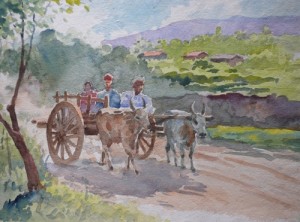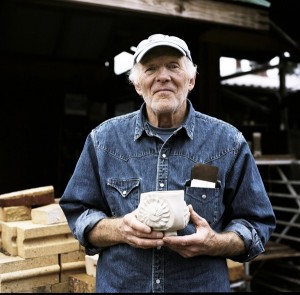Two poets from our January 2014 issue interview one another. In the first, here, Katie Rice (Paris in October) interviews Jack Troy (The Wind in the Jug):
Katie Rice: When did you first start writing poetry? Were there poets who inspired you to write?
Jack Troy: When I was in graduate school, majoring in English and Art, James Dickey was an artist in residence for a week or so, and I was fascinated by the way poetry animated him and was contagious to many of us in his presence. Years before, his poem, “The Shark’s Parlor,” woke we to narrative possibilities, and quickened my necessity to get words to serve that interest.
KR: I know you are a potter. Do you see any overlap between your process for writing and your process for art? How are they similar and different?
JT: This question is inevitable. I am a potter who writes, not vice versa. A pot can only be in one place, whereas poems can exist undiminished in thousands of places. Working in clay clay is physically demanding and saves me from the sedentary aspects of writing, while at the same time providing access to reflections that sometimes instigate poems. I love making objects for daily use – cups, bowls, pitchers – that have the potential to, in Thoreau’s words, “affect the quality of the day.” After 50+ years, I’m confident that my pots are in use at any mealtime in any North American time zone. I try to keep alert to the phrases and observations that deserve a context in language. As Stevens said, “It is not every day that the world arranges itself into a poem.”
KR: Are there specific poets that you turn to time and again? Why?
JT: Jack Gilbert and Jane Hirshfield and two whose work keeps drawing me in, although I can’t remember a single line from either. Translating their attentiveness to experience into language – each is a master at that; they mentor me. I have been mining Wallace Stevens’ “Adagia” for years: “To live in the world, but outside of existing conceptions of it,” is one gem.
KR: (I know I’m stealing this from you, but I think it’s a great question): How do you judge the success of your poems?
JT: If a poem surprises me years after it’s been written – if its freshness survives – is one measure of its success. And like all writers, I enjoy knowing what a poem carries and delivers to the reader. If I live long enough, I will be interested to see if earlier poems turn out to be “poems about poetry,” but none have yet.
KR: What is your writing process like?
JT: The best poems spring from subjects that ruthlessly demand to be set right. I try to do justice to whatever urge comes upon me to give a subject its due, to sort the pure metal of itself from the ore that may or may not contain it. Mornings are my best times to write.

KR: This issue was about recovery through art–how do you think art makes (or doesn’t make) recovery possible?
JT: When I received my daughter’s autopsy report from the Tucson Medical Examiner’s office, I immediately began writing a poem that helped me deal with the aftermath of her death, even though it had occurred several weeks earlier. The scientific language anchored the factual aspects of the post mortem and that degree of reality was somehow necessary for my recovery.
Jack Troy is a potter, teacher and writer who lives and works in Huntingdon, PA. He has taught over 200 workshops for potters and his work in clay has taken him to 24 countries. His poems have appeared in West Branch, Pivot, Friends Journal, Kestrel, The Studio Potter, and Common Ground. His collection of poems, Calling the Planet Home, was self-published in 2003. His website is jacktroy.net
Katie Rice earned her BA in English: Creative Writing from Colgate University. She now works at Penguin Random House and lives in Brooklyn, NY. Her poems have appeared in Black Bottom Review.


Pingback: The Wind in the Jug | Rkvry Quarterly Literary Journal